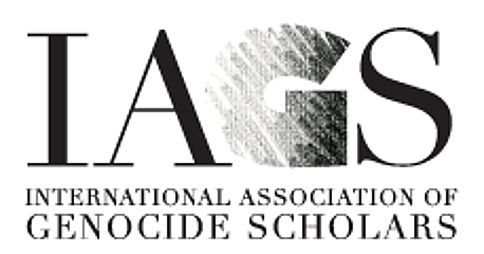 Mit ihrem gemeinsamen Schreiben appellierten die zehn bisherigen Präsidenten der international größten Berufsvereinigung von Genozidwissenschaftler_innen an den Deutschen Bundestag, den Genozid an „der armenischen, assyrischen und griechischen Bevölkerung des Osmanisches Reiches“ in Schriftform anzuerkennen. Ihre postalisch und per Email versandten Schreiben richteten sie an den Bundestagspräsidenten Prof. Dr. Norbert Lammert, den Vorsitzenden des Auswärtigen Ausschusses des Deutschen Bundestag, Dr. Norbert Röttgen, sowie die beiden Fraktionsvorsitzenden Kauder und Oppermann.
Mit ihrem gemeinsamen Schreiben appellierten die zehn bisherigen Präsidenten der international größten Berufsvereinigung von Genozidwissenschaftler_innen an den Deutschen Bundestag, den Genozid an „der armenischen, assyrischen und griechischen Bevölkerung des Osmanisches Reiches“ in Schriftform anzuerkennen. Ihre postalisch und per Email versandten Schreiben richteten sie an den Bundestagspräsidenten Prof. Dr. Norbert Lammert, den Vorsitzenden des Auswärtigen Ausschusses des Deutschen Bundestag, Dr. Norbert Röttgen, sowie die beiden Fraktionsvorsitzenden Kauder und Oppermann.
30 September 2015
Bundestagspräsident Prof. Dr. Norbert Lammert
Platz der Republik 1
D-11011 Berlin, Germany
Dear Prof. Dr. Lammert:
We write to you as the past presidents of the International Association of Genocide Scholars, the largest body of scholars who study genocide, concerning the resolution on the Armenian genocide that may be before you now.
The German government’s engagement with the Armenian genocide is vitally important to the international perspective in the aftermath of this history. The German Bundestag’s non-binding resolution of June 2005 concerning the annihilation of the Armenians in Turkey provides an important context for the new proposal that is now being considered in the Foreign Committee of the Bundestag.
In order for progress toward reconciliation to be made between Turkey and the Armenian Republic and the Armenian people, acknowledgement of the historical facts about one of the most devastating human rights atrocities of the modern era must be made. As the Bundestag noted in 2005. “The German Bundestag is painfully aware from its own national experience how hard it is for every people to face the dark sides of its past. But it also believes that facing one’s own history fairly and squarely is necessary and constitutes an important basis for reconciliation.”
Furthermore, the 2005 resolution read: “The German Bundestag honors and commemorates the victims of violence, murder and expulsion among the Armenian people before and during the First World War. The Bundestag deplores the deeds of the Young Turkish government in the Ottoman Empire that resulted in the almost total annihilation of the Armenians in Anatolia. It also deplores the inglorious role played by the German Reich which had made no attempt to intervene and stop these atrocities.”
In the centennial year, the opinions of Pope Francis I, the governments of Austria, Brazil, Belgium and Luxembourg, as well as the European Parliament, were significant and have joined 20 other countries (including France, Russia, Poland, Greece, Sweden) that have called for Turkey to deal with its Armenian past honestly. The front page New York Times headline of April 17, 2015 underscored the importance of this ethical issue: “A Century After A Genocide, Turkey’s Denial Only Deepens.”
The outpouring of world opinion in the spring of 2015 underscored the moral importance of official acknowledgement of the Ottoman government’s genocide because its successor state, the Republic of Turkey, continues to carry on an aggressive campaign of denial and falsification of the historical facts. Not only has there been no restitution, but Turkey’s campaign to pressure foreign governments and institutions (museums, school boards, media) to disallow the representations of the Armenian genocide is a violation of sovereign democratic rights and is ethically deplorable.
German documents on the Armenian genocide are an important part of the historical record. The documentary scholarship of Johannes Lepsius , the collection of eyewitness photographs of Armin T. Wegner, the eyewitness accounts of numerous German diplomats, officers, missionaries, nurses, engineers and railway workers, and the massive collection of German diplomatic correspondence in the archives of the German Foreign Office, and in Wolfgang Gust’s major collection of foreign office records: The Armenian Genocide: Evidence from the German Foreign Office Archives, 1915–1916, all constitute a significant part of the international historical record.
Germany, more than any country in the 20th century, has dealt with the aftermath of genocide with exemplary courage and moral reckoning. Germany has been a world leader in its ability to face its past, create a powerful culture of historical memory and deal with issues of recompense and social justice in the wake of the Holocaust. Thus, a statement from Germany affirming the historical facts and historical record of the Ottoman Turkish genocide against more than 3 million Christians—including more than a million Armenians according to the estimate of the German Embassy in Constantinople in October, 1916—would have great moral significance for this centennial moment.
We call on German legislators in this centennial year of 2015 to officially resolve in written form the forceful legal opinions made by speakers of all parliamentary factions on, April 24, 2015, confirming the genocide against the Armenian, Assyrian and Greek populations of the Ottoman Empire. We believe German leadership will help Turkey to address its own struggles with historical memory and will help support progressive forces inside Turkey, and Turkey’s forward progress as a proud nation.
For further correspondence please contact Professor Roger Smith whose email is with his name below.
Sincerely,
Joyce Apsel, Professor of Global Studies, New York University, jaa5@nyu.edu
Frank Chalk, Professor of History, Concordia University, Montreal, and Co-Director of the Montreal Institute for Genocide Studies, drfrank@alcor.concordia.ca
Israel W. Charny, Professor Emeritus of Psychology, Hebrew University, Jerusalem, and Executive Director, Institute on the Holocaust and Genocide, encygeno@mail.com
Daniel Feierstein, Professor and Director of the Center for Genocide Studies, Universidad Nacional de Tres de Febrero, Argentina, dfeierstein@genocidescholars.org
Alex Hinton, Director, Center for the Study of Genocide and Human Rights, Rutgers University, ahinton@andromeda.rutgers.edu
Robert Melson, Professor Emeritus of Political Science, Purdue University, and Professor of Holocaust and Genocide Studies, Clark University, melson@polsci.purdue.edu
William Schabas, Honorary Chairman of the Irish Centre for Human Rights at the National University of Ireland, Galway, william.schabas@nuigalway.ie
Roger W. Smith, Professor Emeritus of Government, College of William and Mary, Virginia, theseus51@msn.com
Gregory Stanton, Distinguished Professor of Human Rights, Mary Washington University, Virginia, and President, Genocide Watch, gregoryhstanton@aol.com
Andrew Woolford, President, IAGS (current), Professor of Sociology, University of Manitoba, Canada, andrew_woolford@umanitoba.ca
